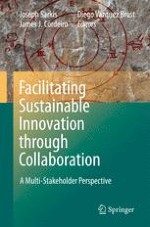2010 | OriginalPaper | Buchkapitel
5. Regional Sustainability, Innovation and Welfare Through an Adaptive Process Model
verfasst von : Kjell-Erik Bugge, Bill O’Gorman, Ian Hill, Friederike Welter
Erschienen in: Facilitating Sustainable Innovation through Collaboration
Verlag: Springer Netherlands
Aktivieren Sie unsere intelligente Suche, um passende Fachinhalte oder Patente zu finden.
Wählen Sie Textabschnitte aus um mit Künstlicher Intelligenz passenden Patente zu finden. powered by
Markieren Sie Textabschnitte, um KI-gestützt weitere passende Inhalte zu finden. powered by
